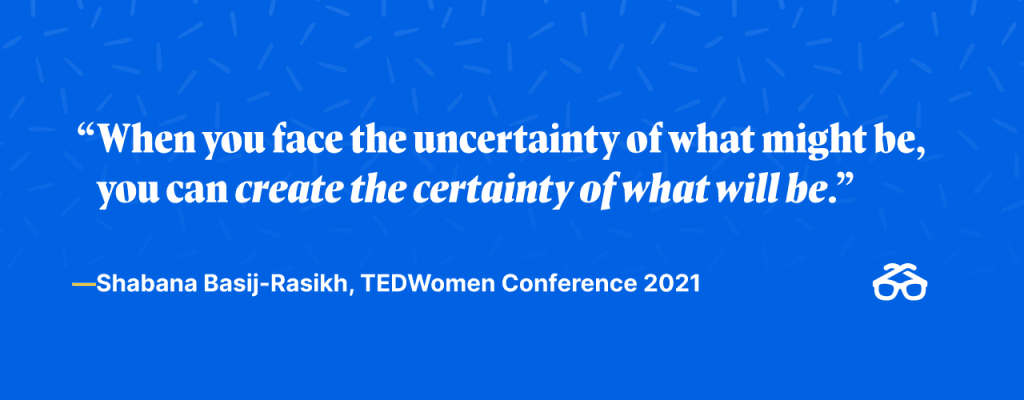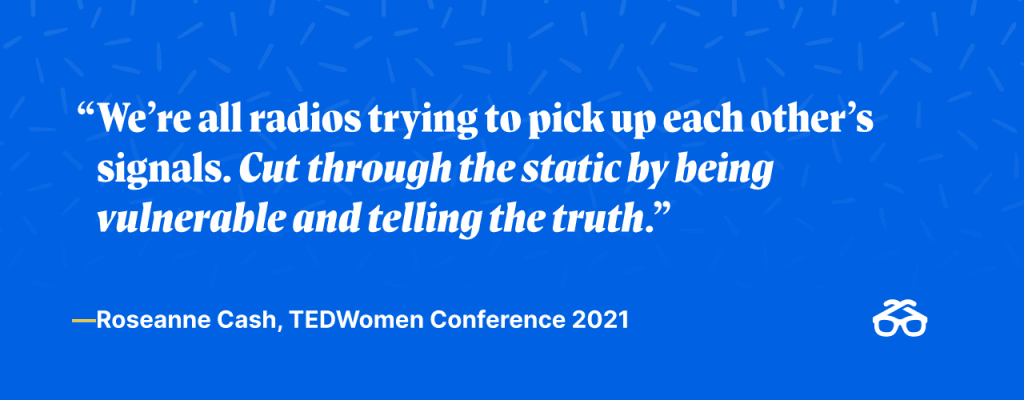It’s time for managers to step up and support their people like never before. Amid increasing worker anxiety, the Great Resignation and shifting workplace priorities, managers are uniquely positioned to play a bigger role in their workers’ well-being and development. Indeed, a Gartner study found a supportive manager can boost employee performance by up to 26% and more than triple the likelihood workers are high performers. In contrast, a non-supportive manager is more likely to lose good employees.
At Degreed, we believe everyone deserves opportunities to learn and grow — in the workplace and out. We’re proud to partner with TED@Work through an integration in the Degreed platform that creates an immersive and engaging experience for workers and learning teams. They can explore highly relevant (sometimes envelope-pushing) ideas on leadership, diversity and inclusion, and more.
And last month, we sent seven of our female managers to attend TEDWomen 2021, a three-day conference focused on highlighting and enabling a new wave of creators and change-makers.
We participated in sessions led by TED speakers, jam-packed with relevant insights. Let’s take a look at some of our favorite takeaways, inspired by feedback and reflections of the Degreed team that attended:
1. Lead with Equity
We enjoyed hearing leadership and equity expert Dr. Dwinita Mosby Tyler (and highly recommend her talk on allyship). Sometimes people confuse equality and equity or use these terms interchangeably. But they’re not the same. Equality is about providing the same resources at every level. Equity is about creating systems so everyone can have access to resources appropriate and specific to their level or role.
We’re going to strive to keep this in mind when talking with our people. We don’t know everything they’ve experienced in life, and what they’ve had to do to get to where they are. Instead of using exclusionary practices like judging a person’s potential based on their employment history, we should continue to embrace a diversity of perspectives, interests and experiences.
2. Embrace Uncertainty
During a session titled “What Now … for women and the world?” Afghan educator Shabana Basij-Rasikh recounted what she experienced following the return of the Taliban to power last year. She’s managed to keep the girls’ school she founded in Afghanistan open and operating after relocating to a temporary location in Rwanda.
“When you face the uncertainty of what might be,” Basij-Rasik said, “you can create the certainty of what will be.”

If we plan for change, we can quickly adapt. In Shabana Basij-Rasik’s case, it might have saved lives. She evacuated 250 students and relocated in just 15 days.
Shabana Basij-Rasikh’s impressive story is a good reminder to look up from our everyday lives and discussions about the pandemic to ask ourselves, what conversations could we be having more of?
And although the context might be drastically different, are there any lessons here about navigating this new reality we’re in as managers and workers? How can we apply this mindset at our workplaces? We can accept the reality that things are shifting, and embrace the new climate. We’ll also be better positioned to make thoughtful decisions and keep moving forward, with a goal to adapt.
3. Use Intention and Purpose as Anchors
We’d love to be superheroes, but our lives and work don’t take place in the Marvel Cinematic Universe. This means we can’t do everything at our highest level of performance.
And that’s okay. When we accept this, we can start to focus on doing those things we are great at. In other words, we can use intention and purpose as anchors in work. And be okay with saying “I don’t know.” This came up several times at the conference — as something many people clearly struggle with.
We can apply this practice of acceptance as a supportive manager. Our workers are human and don’t perform at 100% every day.
4. Bring Your People Along
A supportive manager is constantly listening. We can talk with our people regularly to get their opinion and thoughts and use this information to make better-informed decisions. Good questions include: What do you think? What do you see that I might not see? What are you hearing that I’m not?
These are also great communication tips that apply in other contexts, like negotiation and disagreement. When the people we’re speaking with know we’re genuinely considering their opinions, it can “grease the skids” of the discussion and open up pathways. (We learned this from world debate champion and expert negotiator Julia Dhar.)
5. Cut Through the Static
With more and more companies going remote, maintaining communication is key to making work more efficient and halting disruption. Even if your company isn’t remote, it’s still vital to talk openly and honestly.
What can we do to foster a more open and safe space as a supportive manager? Be vulnerable. Cut down on the jargon and be human. As singer-songwriter Roseanne Cash said in her TEDWomen performance, “We’re all radios trying to pick up each other’s signals. Cut through the static by being vulnerable and telling the truth.”

As a supportive manager, our example can be a catalyst to building psychological safety within our teams.
Want to Learn More?
Discover more through TED@Work for Degreed with 600+ powerful TED ideas that support business-critical skills like team-building, managing stress and inclusive leadership. Because companies need more opportunities for connection now more than ever before, all TED content fuels both individual learning and team discussions on ideas. It is tagged against the Degreed skills taxonomy and built natively into Degreed.
Contact a Degreed representative today to learn more about TED@Work for Degreed.
